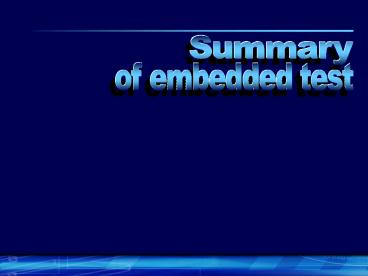Embedded test tutorial PowerPoint PPT Presentation
1 / 26
Title: Embedded test tutorial
1
Summary
Summary
of embedded test
of embedded test
2
ATPG - test pattern generation process
1. Target faults
2. Generate test cube 1-5
3. Random fill 99-95
4. Stimuli on ATE
5. Response on ATE
3
Scan/ATPG - non-embedded solution
ATE stimuli
ATE reference
The same width
The same frequency
Mirror images ATE and scan
4
ATPG - the bandwidth problem
- Deterministic
- High fault coverage
- Arbitrary fault models
- Minimal number of
- patterns
- Non-Embedded
- Simplicity
- - Limited number of
- scan chains
- - Limited bandwidth
5
Logic BIST
100
Fault coverage
- BIST-ready core requirement
- Random pattern testable
- X-free responses
6
Logic BIST
- Generators
- Pseudorandom - PRPG
- Biased
- Smart
- Deterministic
E q u a l i z e r
P R P G
M I S R
Control
- Test data eliminated completely
- Deigned for board and system test
7
Logic BIST
- Pseudorandom
- No stored patterns
- - Lower coverage
- - More patterns
- - BIST-ready design
- Embedded
- - More complex
- Unlimited number
- of scan chains
- Short scan load time
8
EDT - Embedded Deterministic Test
- Standard scan
- On-chip continuous flow decompressor
- On-chip continuous flow selective compactor
- Highly compressed deterministic patterns
D E C OMPRESSOR
C OMPA C TOR
9
Embedded and deterministic test
- Deterministic
- High fault coverage
- Arbitrary fault models
- Minimal number of
- patterns
- Embedded
- - More complex
- Unlimited number
- of scan chains
- Short scan load time
- Embedded
- Simple
- Unlimited number
- of scan chains
- Short scan load time
10
ATPG cycles, coverage, and volume
100
ATPG coverage
80
ATPG volume
60
40
20
0
Cycles
11
LBIST cycles, coverage, and volume
100
ATPG top-up coverage
BIST coverage
80
60
40
ATPG top-up volume
20
0
Cycles
12
EDT 10X cycles, volume, and energy
100
80
60
40
20
0
Cycles
13
Radar View of DFT Technologies
Reference
14
ATPG
15
ATPG, Logic BIST
16
Logic BIST ATPG top up patterns
17
EDT
4
6
8
10
18
Logic BIST summary
- Logic BIST is ideally suited for applications
where stored patterns are prohibitive, i.e.
system test - Test coverage objectives are achieved by
pseudorandom patterns and test points - Unknown states have to be eliminated to allow
signature based compaction - For manufacturing test ATPG top up patterns are
required to achieve the desirable test quality - For very long test experiments some un-modeled
defects can be detected
19
EDT summary
- EDT is designed for optimized manufacturing test
- Based on standard scan
- No test point are required
- Handles unknown states
- Supports effectively variety of fault models,
including path delay faults - Uses tester to execute the test
20
Deterministic forms of embedded test
- Designed for optimized manufacturing test
- Tester controls test application
- Very similar flow to scan/ATPG
- Based on standard scan
- Supports the same fault models as ATPG
- No test points necessary
- No bounding of X states necessary (in EDT)
- On-chip hardware facilitates the improved
efficiency - Compression of volume of scan test data
- Reduction of scan test time
21
Appendices
Appendices
22
Acknowledgements
- Alfred Crouch, Motorola
- Graham Hetherington, Texas Instruments
- Mark Croft, Mentor Graphics
- Geir Eide, Teseda
- Rudy Garcia, NP Test
- Abu Hassan, Mentor Graphics
- Mark Kassab, Mentor Graphics
- Nilanjan Mukherjee, Mentor Graphics
- Jun Qian, CISCO
- Nagesh Tamarapalli, Mentor Graphics
- Robert Thompson, Magma DA
- Janice Lawson Richards , Mentor Graphics
23
References and sources
- Conference proceedings and tutorial material
- International Test Conference
- Design Automation Conference
- Design and Test in Europe Conference
- VLSI Test Symposium
- Workshops
- Testing Embedded Core-based Systems
- Memory Technology, Design and Testing
- DFT and BIST Workshops
- Test Synthesis Workshop
24
References and sources
- Magazines and journals
- IEEE Design and Test of Computers
- IBM Journal of Research and Development
- ATT Technical Journal
- IEEE Transactions on CAD of ICS
- IEEE Transactions on Computers
- Journal of Electronic Testing (JETTA)
- Books
- Abramovici et al., Digital System Testing and
Testable Design, Computer Science Press, 1990 - Bardel et al., Built-In Test for VLSI, Wiley,
1987
25
References and sources
- Books
- Van der Goor, Testing Semiconductor Memories
Theory and Practice, John Wiley and Sons, 1991 - Alfred Crouch, Design-For-Test for Digital ICs
and Embedded Core Systems, Prentice Hall, 1999 - Janusz Rajski and Jerzy Tyszer, Arithmetic
Built-In Self Test for Embedded Systems,
Prentice Hall, 1998 - Commercial EDA reference manuals and web pages
- ASIC vendors reference manuals and web pages
- Patent descriptions and US Patent and Trademark
Office web site
26
(No Transcript)

